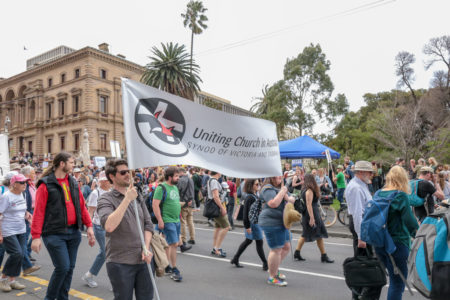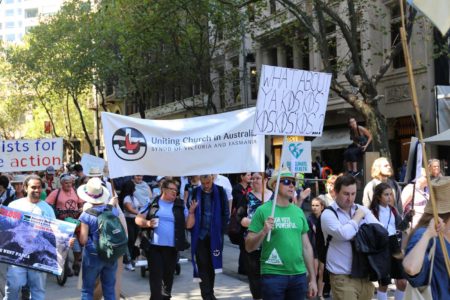By Andrew Humphries
As a long-time member of the Queenscliff-Point Lonsdale Uniting Church, Richard Allen has seen plenty of change in his 27 years as part of the congregation.
It’s a progressive congregation, and one with a real focus on looking after the environment, says Richard, who is also Church Council secretary.
That commitment to protecting the environment becomes more and more important, as the science tells us that mankind’s impact on the world is continuing to drive major climate disruption.
And while that environmental commitment is heavily grounded in faith, it’s also about being part of a wider community approach to arresting the negative impacts of climate change.
“We believe looking after God’s creation should be a missional activity, and something based around scriptural lessons and quotations,” Richard says.
“We are exhorted to look after the planet and God’s creation, so we consider it very much an important missional part of what we do as a congregation.
“But that environmental commitment isn’t just from a purely faith-based perspective.
“It’s about having a real commitment to the environment as part of the wider community, and much of our congregation’s work in this space is done in conjunction with a number of community organisations.
“We’re just a small part of a larger community tackling the impacts of climate change.”
As the wider Uniting Church commits to reducing its carbon footprint and aims for net zero emissions by 2040, congregations like Queenscliff-Point Lonsdale are also doing their bit in the battle against what former Prime Minister Kevin Rudd famously described as “the great moral challenge of our generation”.
“The National Assembly’s pledge around net zero emissions wasn’t the initial driver for us, because we have been embracing moves towards renewable energy sources for a few years before that,” Richard says.
“Having said that, we’re aware of the Assembly’s pledge, we totally support it and feel totally supported in our own efforts.”
At a presbytery level, Richard has regular conversations with the Port Phillip West climate action group and has been invited to join its committee, a perfect opportunity to continue promoting educational efforts around the threat posed by climate change.
“I’m an optimistic person by nature and I think we can do something better or we’re all going to bear the consequences of climate change,” he says.
“We as a church community are determined to play our part in fighting global warming and climate change with all the means that we are able.”
Doing something better on the renewables front has become something of a mantra for the congregation, from embracing the use of solar panels to making a move away from gas.
Among the projects completed by the congregation are the installation of a solar battery in the Queenscliff church hall, electric ovens replacing gas in the Queenscliff kitchen, and electrical ducted heating replacing gas in Queenscliff’s Bay Room.
It’s a small snapshot of what individual congregations with the right attitude can achieve.
“We want to encourage other congregations to do whatever they can to fight climate change,” Richard says.
“This action can range from very small steps to quite significant ones, so things like moving away from the use of fossil fuels to embracing the benefits of recycling, and looking after the planet better in other ways.”

Queenscliff-Point Lonsdale congregations members have embraced the benefits of solar power.
Richard says one of the easiest ways to take up the fight against climate change at a congregational level is to take advantage of the many grants and subsidies available to begin the process of reducing the carbon footprint.
In the Queenscliff-Point Lonsdale congregation’s case, grants have been made available from a number of organisations, ranging from Powering Communities to the Geelong Community Foundation.
Grants are also available through government at a local, state and federal level.
“From our point of view we would be able to do very little without access to grants,” Richard says.
“We’re a congregation without access to any significant bequests, or properties or dwellings we could lease out to raise money, so grants are an important part of our fundraising.”
Richard says as long as a congregation has one or two members prepared to spend the time exploring grants, they have potential access to a rich vein of funding to tackle climate change by embracing renewable energy.
It’s a process that must, says Richard, begin with a small step, but it’s that initial step that can propel a congregation towards achieving wonderful things.
“You’re not going to get anywhere on the journey towards mitigating the impacts of climate change until you take that first step,” he says.
“One of the things we achieved last year was to turn off gas at our Point Lonsdale Kirk’s Place building, so now everything is electrically powered, and that’s a small step making a big difference.
“If we can influence one other congregation to go down the same path we will feel that we have had success.”
Grants spark energy solutions
The Queenscliff-Pt Lonsdale congregation’s renewable energy program has been made possible thanks to a number of grants.
Projects completed or under way include:
Installation of a solar battery in Queenscliff church hall, funded by a Powering Communities grant.
Electric ovens replacing gas in Queenscliff kitchen, funded by Geelong Community Foundation grant.
Electrical ducted heating in Bay Room, Queenscliff, funded by Community Climate Change and Energy Action grant from Sustainability Victoria.
Hot water service to kitchens and toilets at Queenscliff, partially funded by Presbytery of Port Phillip West Simpson Fund.
Congregations should approach their respective local government organisation to find out what grants might be available.
Grants are also available from respective state and federal governments, and those websites listed below are a useful starting point for congregations (the shorter URLs are for each home page, with easy-to-follow links to access funding information on that page):
Victorian Government
Tasmanian Government
Federal Government




